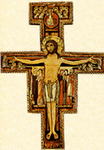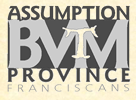St. Elizabeth of Hungary attending to the poor
She died shy of her 24th birthday; she was rejected by her deceased husband's family and became virtually homeless; she was a widowed Mom of four children; she ardently loved her husband; she gave generously to the poor.
This was a rather dynamic woman, this Elizabeth of Hungary. The universal Church celebrates her festival today, and for Franciscans, friars, nuns, Sisters and Secular Franciscans alike, this is a feast day to celebrate God's goodness manifest through this amazing woman.
She lived contemporaneously with St. Francis and St. Clare of Assisi, although she never met them. She lived north of the Alps while they, of course, lived on the Italian peninsula, south of the Alps.
Elizabeth lived in a violent age, and her mother was apparently murdered while she was a young girl. Having been betrothed at 13 years of age to marry Louis, the landgrave of Thuringia, she willingly did so, as was the custom of filial obedience in those days for a daughter of royalty.
Unlike so many unhappy marriages, which may have been contracted solely for commerce or political alliances, Elizabeth and Louis genuinely loved one another. In the royal palace, during the celebration of the Eucharist, they would gaze upon one another in rapturous love, so deeply convinced in their hearts that indeed the Lord had guided them to the marriage covenant. And their children knew it, too!
Elizabeth was very generous to the poor, with her husband's blessing. Sadly her husband died tragically in the Crusades and subsequently her in-laws, who were not favorable to her for several reasons (among them her generosity to the poor!), evicted her from the palace. Her brother-in-law, having laid claim to the crown, even forbade any of his subjects to take her in!
In the meantime, some men of the newly founded Order of Friars Minor had arrived in the vicinity and were blessed to have Elizabeth as one of their benefactors. Even though she was rejected by her late husband's family, she was loved by the people. She, together with the friars, began a hospital for the poor. Eventually some women joined her in the effort on behalf of the poor and they had a community of sorts.
Inspired by the friars, Elizabeth became a member of the Franciscan family, what used to be called the Third Order and who are now called Secular Franciscans.
In religious art Elizabeth is frequently depicted with roses and bread, due to her love for the poor and her outreach to the marginalized. She herself knew from her own life experiences what it was to be an outcast and, rather than become bitter, she chose to love. Her life of penance and asceticism, even while living in a royal household consisted in her simple clothing, suffering the indignities of her in-laws and her generosity to the poor.
She has become the co-patron of the Secular Franciscan Order, along with St. Louis IX of France (no relationship to her husband, Louis), also a contemporary, although, again, they never knew one another.
What a marvelous model for young adults! This young woman, single mother and widow, lived for the Lord Jesus and for him alone. Eventaully she was to be reconciled with her husband's family, but through it all, she never sought vengeance. She gave herself over to love, especially among the poor. And like her spiritual father, St. Francis of Assisi. she saw in the poor the face of Christ crucified.
 As a way to choose life it seems that we as Catholic Christians must be in the forefront of concern for people with HIV and AIDS. It has been a long time since the mysterious illness in the early 1980s first began wreaking havoc among young men who were mostly homosexually-oriented and active.
As a way to choose life it seems that we as Catholic Christians must be in the forefront of concern for people with HIV and AIDS. It has been a long time since the mysterious illness in the early 1980s first began wreaking havoc among young men who were mostly homosexually-oriented and active. 
















